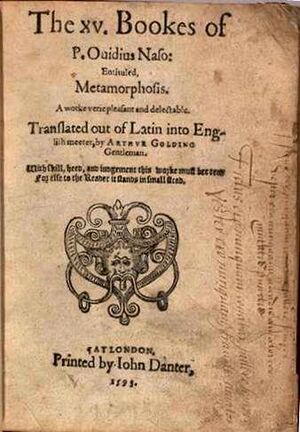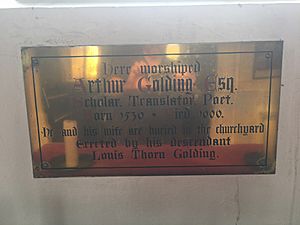Arthur Golding facts for kids
Quick facts for kids
Arthur Golding
|
|
|---|---|
| Born | 1536 |
| Died | 1606 |
Arthur Golding (born around 1536, died May 1606) was an English translator. He translated over 30 books from Latin into English. Today, he is best known for his translation of Ovid's Metamorphoses. This work greatly influenced William Shakespeare. In his own time, Golding was famous for translating Caesar's Commentaries. His translations of John Calvin's sermons also helped spread the ideas of the Protestant Reformation.
Contents
Arthur Golding's Life Story
Arthur Golding was born in East Anglia around 1536. He was the second son of John Golding. His father was an auditor for the government. Arthur's family was quite wealthy from the cloth trade. They became very respected by the time he was born.
When Arthur was 11, his father passed away. His half-sister, Margery, married John de Vere, 16th Earl of Oxford. By 1552, Arthur's brother Henry worked for the Earl. Arthur himself worked for Edward Seymour, 1st Duke of Somerset in 1549. Seymour was a powerful leader at the time.
In 1552, Arthur went to Jesus College, Cambridge. Later, he worked for William Cecil, Lord Burghley. Cecil was a very important advisor to Queen Elizabeth I. Golding dedicated some of his translations from Cecil's home.
Golding married Ursula sometime before 1575. They had eight children. After his older brother Henry died in 1576, Arthur inherited some property. However, this property came with many debts. He also had expensive legal fights with his brother's family. Golding borrowed a lot of money. In the early 1590s, he was even in prison because of his debts. He died in May 1606 and was buried in Belchamp St Paul.
Translating Ovid's Metamorphoses
Golding is most famous for translating Ovid's Metamorphoses. This book is a collection of ancient Roman myths. It tells stories about gods and heroes changing into different forms. Golding's translation was the first to be done directly from Latin into English.
The first edition came out in 1567. New versions were printed in 1575, 1587, 1603, and 1612. Many famous writers read Golding's translation. These included William Shakespeare and Edmund Spenser. Golding's version was lively and captured all the emotions and plot twists of Ovid's stories. His translations were clear and easy to read.
Here's a small part where Ovid compares blood gushing from a wound to water from a pipe:
As when a Conduite pipe is crackt, the water bursting out
Doth shote it selfe a great way off and pierce the Ayre about.
This shows how Golding made the ancient stories vivid for his readers.
The full title of his first Ovid translation was The Fyrst Fower Bookes of P. Ovidius Nasos Worke, Entitled Metamorphosis, Translated Oute of Latin into Englishe Meter. He finished all fifteen books of Ovid's poem in 1567. This translation had a huge impact. It influenced plays like Christopher Marlowe's Tamburlaine and Edward II. Shakespeare knew Golding's Ovid well and used it in many of his plays.
Golding was a strong Puritan. Puritans were a group of Protestants who wanted to make the Church of England simpler. He wanted his translation to be read as a moral lesson. On the title page, he warned readers:
With skill heede and judgment thys work must bee red
For else to the reader it stands in small stead.
He believed that even though the stories were pagan, they could teach good lessons. He tried to show how these ancient myths could fit with Christian ideas. Many people in Shakespeare's time learned about classical myths from Golding's book.
Other Important Translations
Most of Golding's work involved translating prose from Latin and French. As a Calvinist (a type of Protestant), he translated works by important Protestant leaders. These included Heinrich Bullinger, William, Prince of Orange, and John Calvin.
He also translated historical works. These included Leonardo Bruni's History of the War Against the Goths and parts of Froissart's Chronicles. He even translated Aesop's fables.
Some of his other notable translations were:
- Caesar's Commentaries (1563, 1565, 1590)
- The history of Junianus Justinus (1564)
- Writings by theologians like Niels Hemmingsen (1569) and David Chytraeus (1570)
- The De Beneficiis of Seneca the Younger (1578)
- The geography of Pomponius Mela (1585)
- Calvin's commentaries on the Psalms (1571) and his sermons on other parts of the Bible.
Golding also finished a translation of Caesar's Gallic War after the original translator, John Brende, died. He also completed a work by Philippe de Mornay called A Worke concerning the Trewnesse of the Christian Religion (1604).
Golding wrote a few original works too. One was about a murder in 1577. Another was a Discourse about an earthquake in 1580. In this, he saw the earthquake as a sign from God. He believed it was a judgment on the bad behavior of his time. He translated over 5.5 million words in his lifetime!
Arthur Golding's Lasting Impact
Golding's "puritan way of thinking" was a key part of his writing. In his time, it was unusual to translate works about pagan (non-Christian) societies, like Ovid's Metamorphoses. But Golding didn't let this stop him. He wanted to find Christian lessons in these ancient texts.
He spent time translating works by John Calvin, which helped his reputation as a good Puritan. But by translating and defending "pagan" texts like the Metamorphoses, Golding opened the door for other writers. His translation of Ovid was very important for Shakespeare's knowledge of classical myths. Without Golding's work, many people would not have understood these ancient stories so clearly. Golding's main contribution to English literature was making the Metamorphoses accessible and adding Christian meaning to it.
 | Madam C. J. Walker |
 | Janet Emerson Bashen |
 | Annie Turnbo Malone |
 | Maggie L. Walker |



